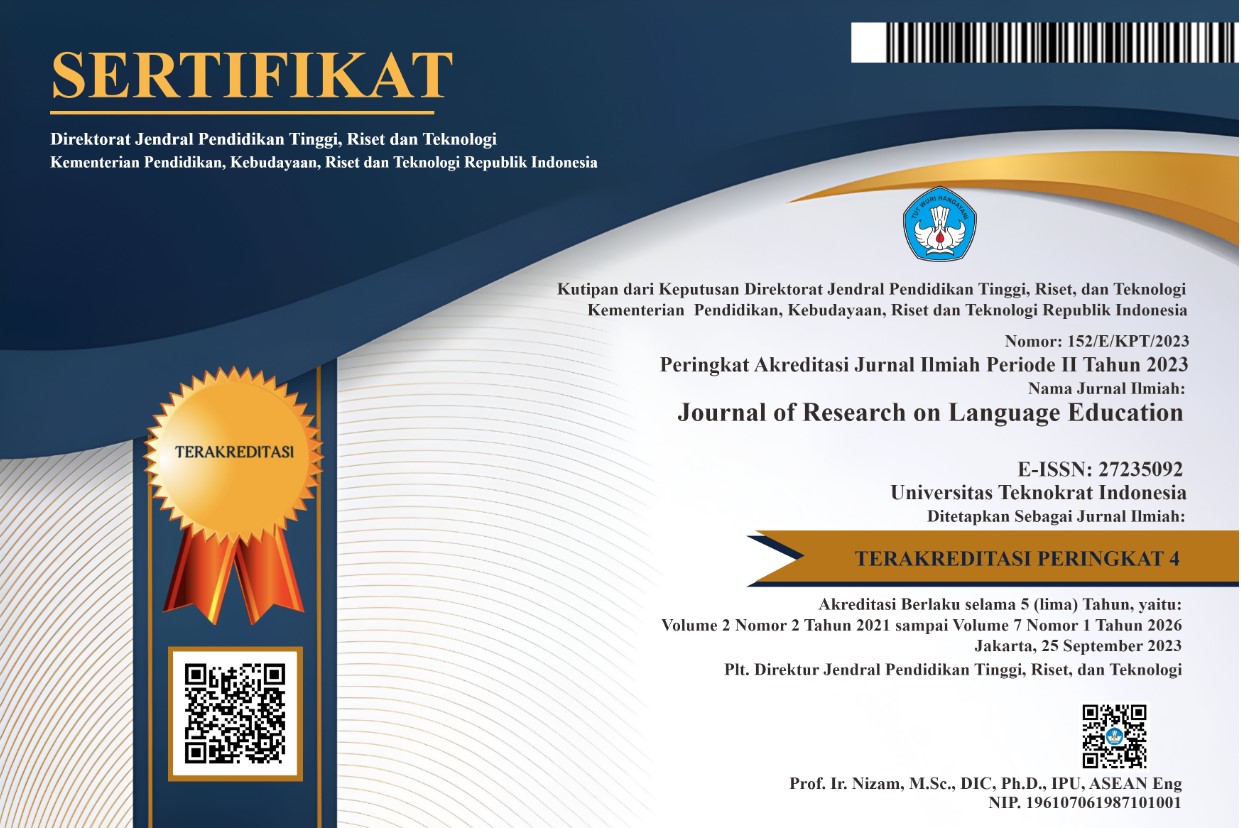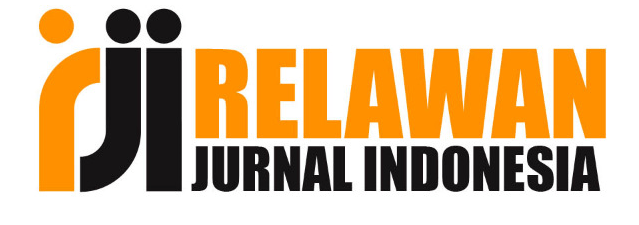THE IMPLEMENTATION OF ONLINE LEARNING IN ENGLISH LANGUAGE TEACHING DURING PANDEMIC: THE TEACHERS VOICE
Abstract
Keywords
Full Text:
PDFReferences
Adeniyi, O. (1995). Staff training and development in Ejiogu (eds). Reading in Organizational Behaviour in Nigeria, Lagos. Maltho use Press Ltd,, p. 159-167.
Alhumaid, K. A. (2020). COVID-19 & E-learning: Perceptions &Attitudes Of Teachers Towards E-Learning Acceptance In The Developing Countries. Multicultural Education, 6(2), 108-109.
Allan, H. K. (2008). Exploring Teacher Acceptance of E‐Learning Technology. Asia-Pacific Journal of Teacher Education, 36(3), 229-243.
Asnawi, N. (2018). Pengukuran Usability Aplikasi Google Classroom Sebagai E- Learning Menggunakan USE Questionnaire (Studi Kasus: Prodi Sistem Informasi UNIPMA). Journal of Computer, Information System, & Technology Management, 1(2), 17-21.
Ayu, M. (2018). Interactive activities for effective learning in the overcrowded classroom. Linguists, 4(2), 1-6.
Ayu, M. (2020). Online learning: Leading e-learning at higher education. The Journal of English Literacy and Education, 7(1), 47-54.
Ayu, M., Sari, F. M., & Muhaqiqin, M. (2021). Pelatihan Guru dalam Penggunaan Website Grammar Sebagai Media Pembelajaran selama Pandemi. Al-Mu'awanah: Jurnal Pengabdian kepada Masyarakat, 2(1), 49-55.
Beuning, P. B. (2014). Teach Better, Save Time, and Have More Fun: A Guide to Teaching and Mentoring in Science. Arizona: Research Corporation for Science Advancement.
Folorunso, O. (2006). An Exploratory Study of the Critical Factors Affecting the Acceptability of E-Learning in Nigerian Universities. Information Management and Computer Security 14(5), 496-505.
Iqbal, M. &. (2010). Enhancing Quality of Education through E-Learning: The Case Study of Allama Iqbal Open University. Turkish Online Journal of Distance Education,11, 84-97.
Mafa, K. R. (2018). Capabilities of Google Classroom as a Teaching and Learning Tool in Higher Education. Botswana: International Journal of Science Technology and Engineering, 5(5).
Rakes, G. C. (2015). Teaching online: Discovering teacher concerns. Journal of Research on Technology in Education, 47(4), 229-241
Randy, G. (2011). E-Learning in the 21st Century. A Framework for Research and Practice, 2, 110-111.
Sabar, K. R. (2011). The Using Web (E-Learning) In Learning Process in Briton International English School. Jurnal Komunikasi KAREBA, 448-454.
Shaharanee, I. N. (2018). The Application of Google Classroom as a Tool for Teaching and Learning. Malaysia Utara University, 8(10).
Tanveer, M. (2015). Integrating E-learning in Classroom-based Language Teaching: Perceptions, Challenges and Strategies. International Conference: "ICT for Language Learning", 2-4.
Yanti, A. S. (2018). Teacher’s Perception about the Use of E-Learning/Edmodo in Educational Activities. IOP Conference Series: Materials Science and Engineering, 4.
Yuen, H. L. (1999). Improving IT training for serving teachers through evaluation. In G. Cumming, T. Okamoto, & L. Gomez (Eds). American: IOS Press, 2, 441-448.
Yuliansyah, A. & Ayu, M. (2021). The Implementation of Project-Based Assignment in Online Learning during Covid-19. Journal of English Language Teaching and Learning, 2(1), 29-34
DOI: https://doi.org/10.33365/jorle.v2i2.1316
Refbacks
- There are currently no refbacks.

This work is licensed under a Creative Commons Attribution-NonCommercial-ShareAlike 4.0 International License.

Articles published in Journal of Research on Language Education is licensed
under a Creative Commons Attribution-ShareAlike 4.0 International License.
English Education Study Program, Faculty of Arts and Education.
Universitas Teknokrat Indonesia
Zainal Abidin Pagaralam 9-11 Bandar Lampung, Indonesia
All rights reserved.








